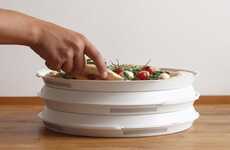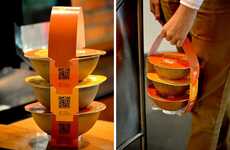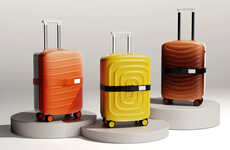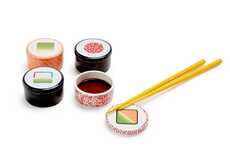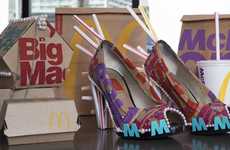
'Sushecō' Recently Developed a More Eco-Friendly Kind of Sushi Tray
Katherine Pendrill — June 15, 2015 — Art & Design
References: kickstarter & treehugger
While sushi has become an immensely popular cuisine in recent years, most take-out restaurants continue to use disposable sushi containers. An estimated half a billion sushi trays are thrown out each year, which has led to a major accumulation of waste. To combat the problem, a team of designers at 'Sushecō' came up with a more eco-friendly alternative.
The clever new sushi container is flat-packed so that it can be easily transported when you head out to a restaurant. The tray will then pop up to twice its height in order to accommodate up to eight large pieces of sushi. The container also features a flexible hinge, which holds a set of reusable chopsticks. The idea is that consumers can use the portable tray as a sustainable alternative to single use sushi containers.
While the product is currently just a prototype, Sushecō has launched a Kickstarter campaign to bring the reusable sushi containers to production.
The clever new sushi container is flat-packed so that it can be easily transported when you head out to a restaurant. The tray will then pop up to twice its height in order to accommodate up to eight large pieces of sushi. The container also features a flexible hinge, which holds a set of reusable chopsticks. The idea is that consumers can use the portable tray as a sustainable alternative to single use sushi containers.
While the product is currently just a prototype, Sushecō has launched a Kickstarter campaign to bring the reusable sushi containers to production.
Trend Themes
1. Eco-friendly Sushi Packaging - Designing sustainable sushi containers to reduce waste and encourage sustainable packaging options.
2. Flat-pack Food Packaging - Innovating flat-pack designs that reduce transportation emissions and can be easily assembled by the consumer.
3. Reusable Packaging - Creating reusable alternatives to single-use packaging that help reduce waste and promote a circular economy.
Industry Implications
1. Food Packaging - Finding innovative ways to design eco-friendly and sustainable packaging options for the food industry.
2. Consumer Goods - Encouraging consumers to adopt sustainable practices by offering eco-friendly and reusable packaging options for their everyday products.
3. Sustainability - Supporting circular economy and sustainability initiatives by developing packaging solutions that prioritize waste reduction and reusable materials.
1.5
Score
Popularity
Activity
Freshness


